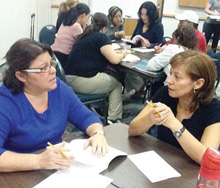Students come to an understanding


Photo Courtesy of Mark Simpson
International students talk during a conversation group meeting.
Nervousness, apprehension, and fear may be preventing native and international students from interacting with each other, said Communications Lab Assistant Lydia Rucker. She said there’s an easy way for the two groups to get together and talk.
Rucker, who also is a writing tutor in the Communications Lab, directs conversation groups twice a week with both international and American students in an effort to change any misconceptions and also help internationals improve their verbal skills.
“Our fear stems from our want to understand but our inability to do so,” she said. “So with anything that you don’t really understand, or anything that makes you somewhat uncomfortable, you tend to avoid it.”
She said the conversation groups use a mix of dialogue and drama to help ESL students improve their English-speaking skills in a relaxed, judgment-free environment.
“It is my theory that improving the self-esteem of ESL students will not only help them build confidence, but also motivate them to speak English more often outside of school,” Rucker said.
“Many ESL students become proficient in reading and writing in schools in their countries, but there is less focus on speaking,” she said. “Therefore, having to verbalize in a new society in a language they are still trying to effectively master can also affect self-esteem.”
There also is a misconception that because the students don’t speak English fluently, they are not intelligent. “Many of the ESL students — some of whom hold degrees in their countries — may feel that they are not truly able to represent the level of their intelligence and personality through speaking another language,” Rucker said.
Getting the two groups together is beneficial for all, Rucker said. One ESL student is quick to agree.
“I speak much better now,” said Elena Collins. Collins holds a doctorate in psychology and is one of several ESL students in the group who hold degrees from their home countries.
“Before this semester I had never spoken in a group. When there were many people, I was quiet.”
Collins taught Spanish for 20 years in her home country of Mexico and is now an independent Spanish tutor in Norman for University of Oklahoma students.
“Now I am more confident with myself in speaking to a group,” she said.
The groups also are inspiring a few of the native English speaking group leaders. “I think the same thing that’s happened with our (international) students has happened for us,” said Bethany Lang, a volunteer tutor with the group. “I’m more comfortable striking up a conversation with an ESL student,” she said.
Kasey Handley and Marijah Adams develop curriculum for the conversation groups. They believe the program is a tremendous asset to the ESL program and OCCC. The conversation groups meet in the Communications Lab on Mondays from 11 a.m. to noon and on Thursdays from 2 to 4 p.m. For more information, contact Rucker at 405-682-1611, ext. 7105, or email her at lrucker@occc.edu.
To contact Mark L. Simpson, email onlineeditor@occc.edu.